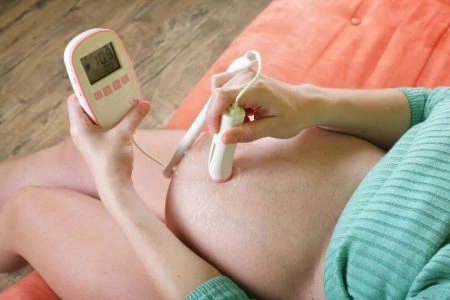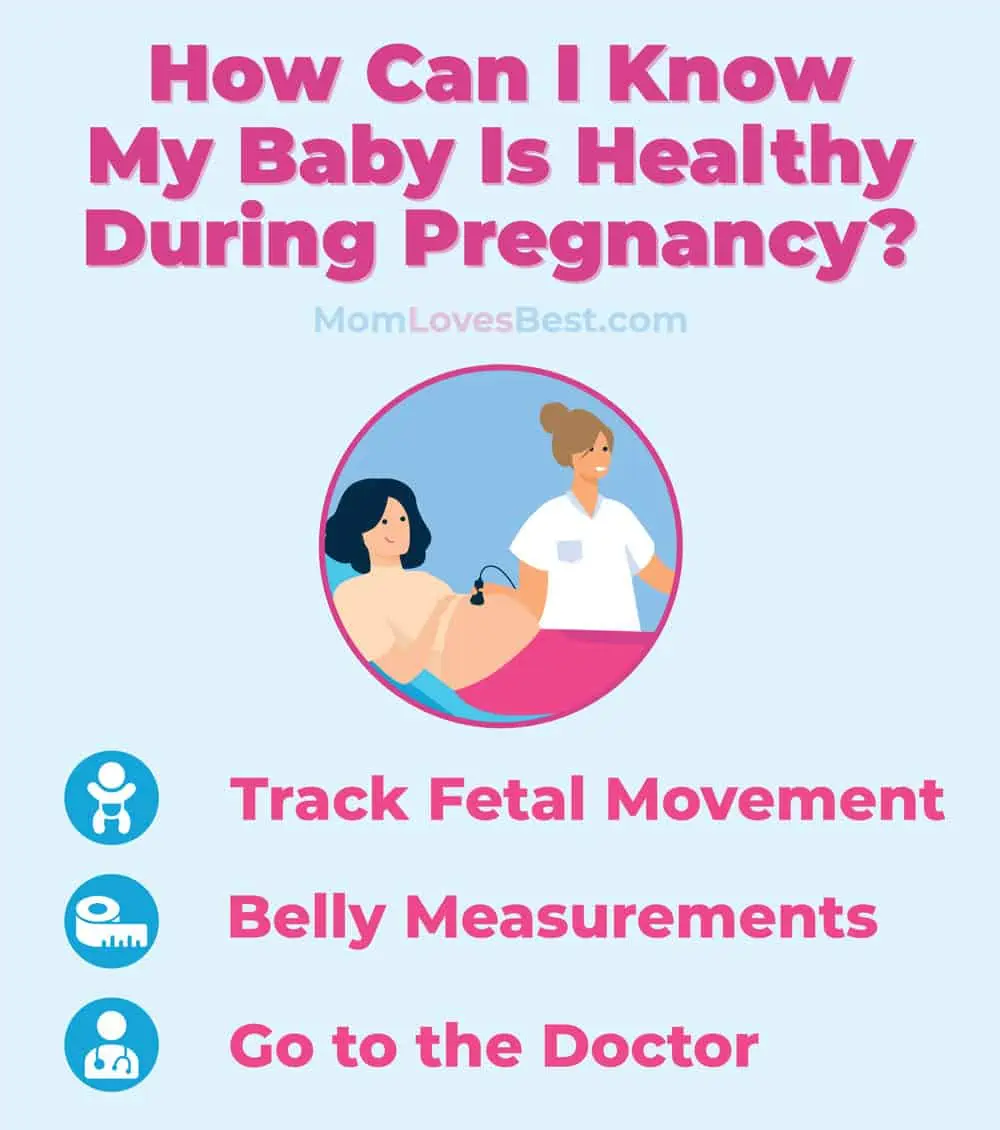Hearing your baby’s heartbeat for the first time is magic.
It’s often the moment pregnancy finally feels “real.” That rhythm brings a sense of security and excitement that’s hard to beat. It’s no wonder many parents want to replicate that feeling at home between prenatal appointments.
Thanks to commercial fetal Dopplers, you can listen in from your living room. But just because you can buy one, does that mean you should? Safety is the top priority for your little one, and there are mixed opinions on at-home monitoring.
We’ve dug into the research, medical guidelines, and safety concerns to help you decide if a fetal Doppler is right for your pregnancy journey.
Key Takeaways
- What It Is: A fetal Doppler is a handheld device that uses sound waves to detect your baby’s heartbeat.
- Medical Advice: The FDA and medical professionals generally advise against unsupervised home use due to potential risks and lack of training.
- The Risks: Misinterpreting sounds can lead to unnecessary panic or, conversely, a false sense of security (false reassurance).
- Best Monitoring: Tracking fetal movement (kick counts) and attending regular prenatal visits are the safest ways to monitor baby’s health.
Understanding Your Baby’s Heartbeat
Before we talk about the gadgets, let’s talk about the biological miracle happening inside you.
Your baby’s heart starts beating around five weeks gestation. Initially, it might be a bit slow, hovering around 100 beats per minute (bpm). As your baby grows, that rate changes.
By nine weeks, the average heart rate hits about 175 bpm. For the majority of your pregnancy, it will settle somewhere between 110 and 160 bpm. As you enter the final ten weeks, the rate may slow slightly (1).
Compare that to an average adult’s resting heart rate of 60 to 100 bpm (2), and you’ll realize just how fast your little one is going.
If an adult had a heart rate that high, we’d worry. For a fetus, that rapid gallop is completely normal and healthy.
What Is a Fetal Doppler?
A fetal Doppler is a small, handheld device that uses sound waves to detect the movement of blood through your baby’s heart (3).
The device usually consists of a main unit with controls and a probe attached by a cord. You apply a specialized ultrasound gel to your belly, which helps the sound waves travel, and move the probe around until you pick up the sound.
However, the Doppler doesn’t just filter for the baby. It picks up the swoosh of your placenta, the rumble of your digestion, and the thump of your own arteries.
Fetal Doppler vs. Ultrasound
People often use the terms interchangeably, but they aren’t quite the same. Ultrasound refers to high-frequency sound waves. During a prenatal checkup, your doctor uses a sophisticated ultrasound machine to create both visual images (sonograms) and audio of your baby.
A fetal Doppler is a simplified type of ultrasound that only produces sound. It doesn’t give you a picture. Think of the Doppler as a radio trying to tune into a specific station, while the doctor’s ultrasound is a 4K television.
Are Fetal Dopplers Safe?
This is the big question. When used by a trained medical professional for short periods, fetal Dopplers are considered safe. However, the FDA and many medical organizations advise against using them at home.
Why the caution? It comes down to how the device is used and how the results are interpreted. Here are five major concerns regarding at-home use.
1. Lack of Training
It seems easy enough: put gel on belly, find heartbeat. But interpreting what you hear is a skill that takes years to master.
Doctors, nurses, and midwives are trained to distinguish the sound of a fetal heart from the sound of the placenta or the mother’s own pulse. They also know where to look based on the baby’s position. Moms using these devices at home don’t have that clinical experience, leading to confusion.
2. Unnecessary Stress
If you can’t find the heartbeat, panic sets in immediately.
In reality, the baby might just be in a tricky position, or you might have an anterior placenta (where the placenta is in front), which muffles the sound. However, not knowing this can lead to a frantic trip to the ER for a heartbeat that was there all along. Stress isn’t good for you or the baby, so avoiding these panic spikes is ideal.
3. False Reassurance
This is perhaps the most dangerous risk. There have been tragic cases where a mother noticed reduced fetal movement but felt reassured because she “heard the heartbeat” on a home Doppler.
She may have been hearing her own pulse or the placenta. Because she felt reassured, she delayed seeking medical help. If you notice a change in movement, a Doppler cannot tell you if the baby is okay; only a doctor can. Always trust your instincts over a gadget.
4. Tissue Heating
Ultrasound waves heat tissue slightly and can produce small bubbles in body fluids (cavitation). The FDA states that the long-term effects of this tissue heating are not fully known.
Medical professionals use ultrasound only when medically necessary and for short durations to minimize exposure. At home, parents might leave the device on for 30 minutes or an hour trying to find a sound, exposing the fetus to significantly more energy than a standard checkup.
Remember
5. Inaccurate Results
Commercial devices you buy online simply aren’t the same quality as the medical-grade equipment at your OB’s office. They are less sensitive and more prone to interference/static.
If you want accurate info on your baby’s health, low-cost electronics aren’t the most reliable source.
If You Decide to Use a Fetal Doppler
We generally advise leaving the monitoring to the pros. However, if you are set on using one, please follow these harm-reduction guidelines:
- Limit the Time: Keep sessions very short. If you don’t find the heartbeat in a few minutes, stop and try again another day.
- Don’t Diagnose: Never use the Doppler to check if the baby is “okay” after a fall or reduced movement. Go to the hospital instead.
- Get a Tutorial: Ask your midwife or doctor if they can show you where to place the probe, though be prepared for them to advise against home use.
- Use Gel: Always use plenty of ultrasound gel to reduce static and improve signal clarity.
If you want to feel more connected to your pregnancy without the tech, consider hiring a doula. They can provide emotional support and reassurance without the risks of medical devices.
How to Know if Baby Is Healthy (Without a Doppler)
You don’t need a machine to know your baby is thriving. There are safer, more effective ways to monitor a healthy pregnancy.
1. Track Fetal Movements
Monitoring kicks and wiggles is the gold standard for at-home monitoring. You’ll typically start feeling movement between 18 and 25 weeks.
In the third trimester, doctors recommend “kick counts.” Pick a time of day when your baby is usually active (often after a meal). You should be able to count ten distinct movements within two hours. If you don’t feel ten movements, or if the pattern changes drastically, call your provider.
2. Belly Measurements
At your prenatal appointments, your provider measures your “fundal height.” This is the distance from your pubic bone to the top of your uterus. It roughly corresponds to how many weeks pregnant you are (in centimeters).
While it’s tricky to do accurately yourself, knowing that your belly is growing steadily is a great visual indicator of health.
3. Prenatal Appointments
Nothing beats regular checkups. Your doctor or midwife will listen to the heart, check growth, and run tests to ensure everything is on track.
If you ever feel “off” or anxious, don’t hesitate to call them. That’s what they are there for. A quick check with a professional is always better than guessing at home.
If you have consulted your doctor and still wish to purchase a device for occasional listening, here are some of the top-rated options currently available.
All measurements aside, the most critical factor is your intuition and your experience. If you feel something is wrong, call your OB provider. Women are experts in understanding their bodies and their babies.
Editor's Note:
Caitlin Goodwin, MSN, RN, CNMPregnancy Warning Signs
Do not rely on a Doppler if you feel something is wrong. Contact your healthcare provider immediately if you experience any of these symptoms (4):
- Vaginal bleeding or spotting.
- Severe cramping or abdominal pain.
- A noticeable decrease or stop in fetal movement.
- Severe dizziness, blurred vision, or fainting.
- Persistent vomiting or inability to keep fluids down.
- Fever over 100.4°F.
URGENT
FAQs
The Bottom Line
While the idea of bonding with your baby via a fetal Doppler is tempting, the potential for added stress and false reassurance makes it a tricky choice. Medical organizations generally advise against them for home use.
Trust your body, count those kicks, and save the heartbeat checks for your doctor visits where you can enjoy that beautiful sound worry-free.












